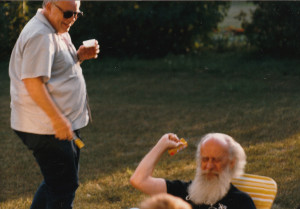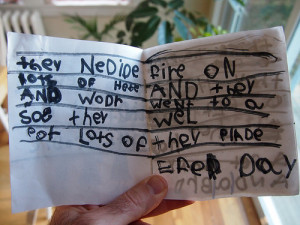“One of the great rewards of a writer’s life is that it lets you read all the books you want to without feeling guilty.” – Damon Knight

Algis Budrys and Damon Knight with water guns at a Clarion BBQ.
One of the gems I picked up at last week’s trip to The Book Thing was author and editor Damon Knight’s excellent Creating Short Fiction. It’s a classic for a reason, full of interesting and necessary exercises for those of us who enjoy reading and writing short stories, and its Golden Age genesis is still quite applicable today. If you aspire to write short stories and have not read this book, you might just be metaphorically ray-gunning yourself in your lower appendages.
This is a book that speaks from experience. This book doesn’t come from the academic ivory tower — although Knight was a prolific and respected teacher — but from countless hours of sitting in front of a typewriter perfecting the craft. What’s more, it deals a lot with the walls, ceilings and plateaus many beginning and semipro writers hit at the beginning of their career; I recognized myself ten years ago on every page, and wished that I had come across it much earlier. You’ll find information about story invention, idea development, structuring a story, and mastering specific aspects of storytelling such as mood, audience manipulation and even how to get through tough times when you think your work is just about the most terrible thing on the market and you’ll never sell anything again.
 This is what I feel like my most recent story looks like. Yep.
This is what I feel like my most recent story looks like. Yep.
During National Novel Writing Month, people talk about being a “planner” versus a “pantser” — i.e., people who write by the seat of their pants, and argue endlessly over which is better. I wasted a lot of years trying to be a “pantser” when what I really needed to be working on was developing the structural mastery that Knight presents in this book. At the same time, Knight warns the reader not to be overly obsessed with hitting each and every plot point where planned, and to let the story you’re writing surprise you sometimes. I think the whole point is to master those technical skills so that when you put on those writing pants, things like mood, tone, plot points and tent poles are second nature.
Basically: if you want to be a writer, write. Write smartly. (And read this book. Seriously.)
—
—
water guns, CC license by William Shunn
photo credit: charlie’s 1st book via photopin (license)
photo credit: Books via photopin (license)







